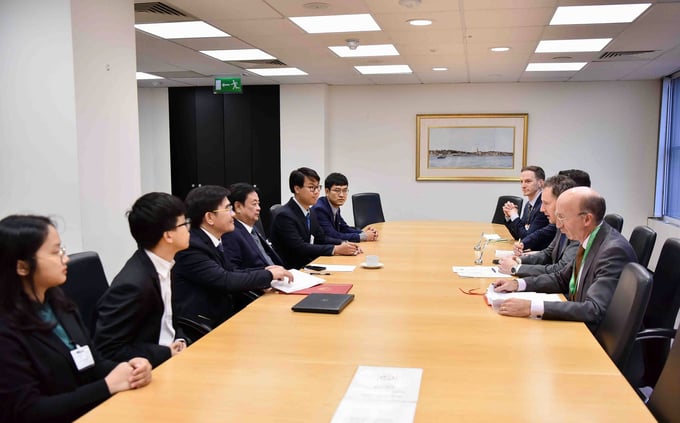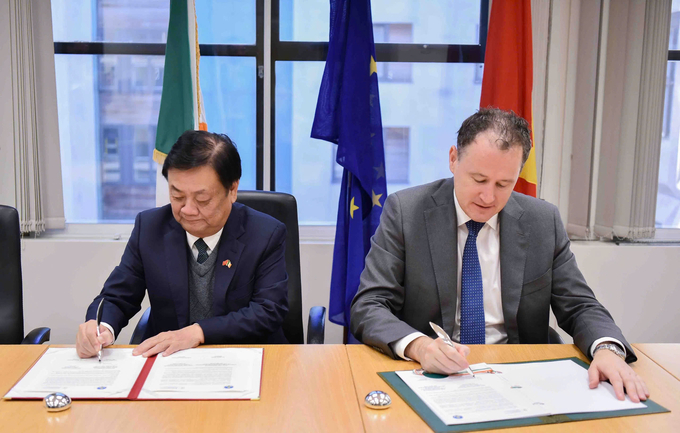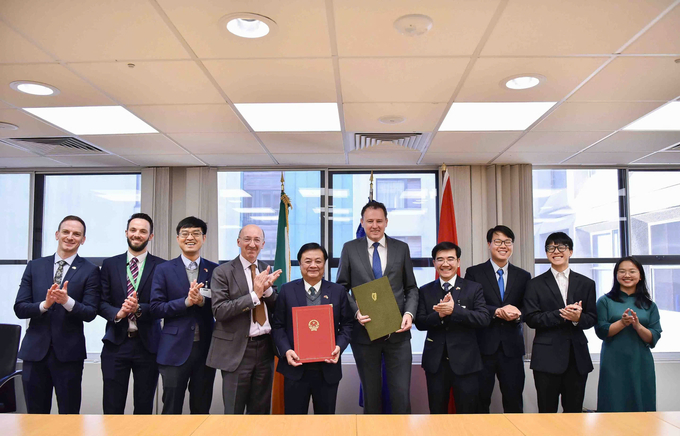June 17, 2025 | 15:45 GMT +7
June 17, 2025 | 15:45 GMT +7
Hotline: 0913.378.918
June 17, 2025 | 15:45 GMT +7
Hotline: 0913.378.918

On October 3, Minister of Agriculture and Rural Development Le Minh Hoan met with Ireland’s Minister for Agriculture, Food, and the Marine, Charlie McConalogue, in Ireland. Photo: ICD.
As part of the official state visit of General Secretary and President To Lam to Ireland, Minister Le Minh Hoan held discussions with Minister Charlie McConalogue on October 3. The two ministers signed a Memorandum of Understanding (MoU), which aims to promote improvements in Vietnam’s food safety systems, traceability, digital transformation, and biosecurity strategies in the livestock sector.
On behalf of the Ministry of Agriculture and Rural Development, Minister Le Minh Hoan expressed his gratitude to Ireland for its support, particularly in staff training. This is being facilitated through the Ireland - Vietnam Agriculture and Food Cooperation Program for 2023 - 2028 (IVAP).
As part of IVAP, the Irish government awarded three scholarships, totaling 2.2 billion VND, to Vietnamese students pursuing master's degrees in areas such as climate change, agriculture and food security, food technology, and science-engineering at Galway University.
Minister Le Minh Hoan is confident that these students will successfully complete their programs and return to Vietnam equipped with valuable knowledge and experience. Their understanding of both Ireland and Vietnam will enable them to become skilled professionals, driving the transformation of Vietnam’s food systems.
During the high-level talks between delegations from Vietnam and Ireland, Irish President Michael Higgins highlighted the potential of Irish cooperatives. Minister Le Minh Hoan echoed this sentiment, stating, "The values, determination, and agricultural expertise of your country can help guide Vietnam in developing its cooperative and collective economy, especially in the face of a rapidly changing world."
Speaking with the delegation from the Ministry of Agriculture and Rural Development, Mr. David Butler, Director of the Sustainable Food Systems Ireland (SFSI) Program, emphasized that the IVAP training program is a key focus of cooperation between the two ministries.
“Our core missions involve promoting sustainable agricultural production, particularly enhancing biosecurity in livestock management, both at the system level and within enterprises. Additionally, we focus on innovation, quality improvement, and cooperative development. The areas highlighted by the Minister are also central themes of the bilateral cooperation program,” Mr. David Butler explained.

Vietnam and Ireland's Ministry of Agriculture signed a cooperation agreement to transform the food system. Photo: ICD.
After hearing the proposals from the Ministry of Agriculture and Rural Development and the Director of SFSI, the Irish Minister expressed that the Memorandum of Understanding signed today will catalyze for the two countries to advance sustainable food systems.
"I believe that we each have an important role to play on the international stage. Together, we can make a global impact by working closely to lead the transformation of food systems," said Minister McConalogue.
Ireland’s agricultural strengths lie in cattle and dairy farming. According to Minister McConalogue, livestock cooperatives are instrumental in producing high-quality dairy products. DAFM leaders emphasized: “We are ready to share with Vietnam the cooperative models that have thrived in Ireland and the experiences Irish farmers have gained through years of development.”

Ireland is ready to share its experience in sustainable livestock development with Vietnam. Photo: ICD.
As part of the cooperation framework, the two sides will advance programs on food safety, livestock disease prevention, and sustainable farming practices. Both ministries agreed to a strategy that will strengthen cooperatives’ capacities to develop green, safe, climate-resilient, and carbon-reducing agricultural systems.
Furthermore, veterinary agencies from both countries will enhance the exchange of information on livestock and poultry disease prevention, with a focus on diagnostic methods and testing for animal diseases.
The two nations will collaborate on research and vaccine production, share experiences in epidemiology, and jointly work on food safety management and microbial risk analysis. Training for food safety analysts, particularly in monitoring chemical residues and veterinary drugs, will also be a key aspect of the cooperation program.
IVAP, funded by the Embassy of Ireland in Vietnam and directly managed by the Sustainable Food Systems Ireland (SFSI), aims to support Vietnam in transforming its food systems through technical assistance, knowledge sharing, training, and skills development on topics such as sustainable production, climate change adaptation, food safety, food system transformation, quality innovation, and competitiveness.
Translated by Quynh Chi
![Turning wind and rain into action: [6] ‘Four on-the-spot’ disaster management software](https://t.ex-cdn.com/nongnghiepmoitruong.vn/608w/files/news/2025/06/14/z6705183772518_8e6a71d5e2d464e10197411eb1d14b51-nongnghiep-192556.jpg)
(VAN) By simply activating the scenario on the disaster management software, the relevant authorities immediately know how many households need to be evacuated, where to evacuate them to, and by what means of transportation…

(VAN) According to the Binh Thuan Department of Industry and Trade, in the first five months of 2025, Binh Thuan's dragon fruit export turnover increased by 20.65% compared to the same period last year.

(VAN) EU countries on Thursday gave final approval to new tariffs on fertilizer imports from Russia, a move aimed at cutting off revenue that could support Moscow’s war in Ukraine, despite concerns from European farmers.

(VAN) The working delegation from the Ministry of Agriculture and Environment conducted an important trip to the Netherlands to strengthen strategic partnerships and sustainable development in the agricultural sector.

(VAN) The letter ‘A Plea from the Ocean’ not only evokes emotion but also awakens the human conscience to the responsibility of protecting life on Earth.

(VAN) The Department of Agriculture in South Africa has announced the country’s first mass vaccination of poultry to prevent local birds from contracting avian influenza.

(VAN) Establishment of the Mekong Delta Regional Agricultural Linkage Center, aiming for a closed value chain, deep processing, trading platforms, and international market connectivity.